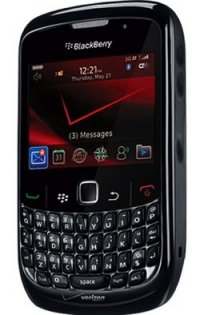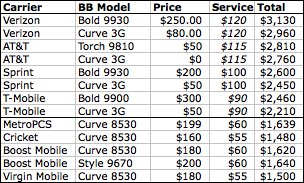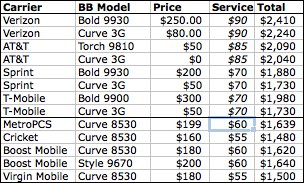The cost savings of a prepaid BlackBerry
The Traditional Way
Most people who want to purchase a BlackBerry phone will do so through a postpaid provider. They’ll select a BlackBerry handset along with appropriate voice, messaging, and data plans. The handset itself will come at a significant markdown from retail, because carriers subsidize handsets in exchange for a two-year service commitment. It’s this subsidy that keeps people coming back to postpaid services.
Prepaid carriers offer a much lesser subsidy, because they don’t require that the customer sign a two-year deal. They could conceivably buy the phone and a plan, and then cancel the service the very next month. If the carrier were to subsidize that handset, they’d be out money, since they expect to recoup it via the customer’s monthly charge. Since paying less brings instant gratification, people to continue gravitating towards postpaid services.
The Prepaid Way
 What’s left unsaid above is the cost savings aspect of prepaid wireless service. If the prepaid carrier were charging similar rates for the same service, while at the same time charging more for handsets, they’d have little advantage. Chances are, they’d remain the domain of individuals with poor or no credit. But since that’s no longer the case, something has to be different. It shines through in the monthly rate.
Many prepaid carriers offer unlimited minutes, messages, and data for a flat monthly rate, which in most instances comes at a discount of $10 to $30 off postpaid service. It’s harder to make these savings tangible, since they don’t happen up front. That is, a postpaid customer walks into a store and pays, say, $215 for a smartphone (with tax). She walks away with a working phone and doesn’t see another charge until the end of the first billing cycle. But when a prepaid customer walks into a store he’ll put much more money on the counter. The phone might cost the same $200, though it will be an older, more outdated model. On top of that, he needs to pay for the first month of service, since it is pre-paid.
It’s easy to see, then, why people prefer postpaid. Not only does the service come from a more recognizable brand name, but customers pay less up front. The further away the costs, the less people think about them when making a purchase. But as we’ll see, prepaid can save.
Two-Year Cost of Ownership
The best way to compare prepaid and postpaid services is by examining the cost over a two-year term, since postpaid users are locked into this term. Prepaid users are, by definition, not locked into this term. But postpaid users seeking savings will find this comparison most useful, due to the already existing two-year term of postpaid.
Most prepaid carriers offer unlimited services, but we don’t have to compare them directly to unlimited offerings from postpaid carriers. We will, but we’ll also look at some lower-cost options on postpaid and make the same comparisons. It should put into perspective not only how much users can save with prepaid, but also the greater level of service they can realize.
Unlimited vs. Unlimited
This table represents the total two-year cost of ownership for BlackBerry smartphones on four postpaid and four prepaid carriers. There are a number of service prices in italics, because these carriers do not offer unlimited data services. For the price listed AT&T and Verizon offer 2GB of data, while T-Mobile offers 5GB. The only truly unlimited option among them is Sprint.
What’s left unsaid above is the cost savings aspect of prepaid wireless service. If the prepaid carrier were charging similar rates for the same service, while at the same time charging more for handsets, they’d have little advantage. Chances are, they’d remain the domain of individuals with poor or no credit. But since that’s no longer the case, something has to be different. It shines through in the monthly rate.
Many prepaid carriers offer unlimited minutes, messages, and data for a flat monthly rate, which in most instances comes at a discount of $10 to $30 off postpaid service. It’s harder to make these savings tangible, since they don’t happen up front. That is, a postpaid customer walks into a store and pays, say, $215 for a smartphone (with tax). She walks away with a working phone and doesn’t see another charge until the end of the first billing cycle. But when a prepaid customer walks into a store he’ll put much more money on the counter. The phone might cost the same $200, though it will be an older, more outdated model. On top of that, he needs to pay for the first month of service, since it is pre-paid.
It’s easy to see, then, why people prefer postpaid. Not only does the service come from a more recognizable brand name, but customers pay less up front. The further away the costs, the less people think about them when making a purchase. But as we’ll see, prepaid can save.
Two-Year Cost of Ownership
The best way to compare prepaid and postpaid services is by examining the cost over a two-year term, since postpaid users are locked into this term. Prepaid users are, by definition, not locked into this term. But postpaid users seeking savings will find this comparison most useful, due to the already existing two-year term of postpaid.
Most prepaid carriers offer unlimited services, but we don’t have to compare them directly to unlimited offerings from postpaid carriers. We will, but we’ll also look at some lower-cost options on postpaid and make the same comparisons. It should put into perspective not only how much users can save with prepaid, but also the greater level of service they can realize.
Unlimited vs. Unlimited
This table represents the total two-year cost of ownership for BlackBerry smartphones on four postpaid and four prepaid carriers. There are a number of service prices in italics, because these carriers do not offer unlimited data services. For the price listed AT&T and Verizon offer 2GB of data, while T-Mobile offers 5GB. The only truly unlimited option among them is Sprint.
 Since unlimited everything plans on postpaid carriers are necessarily expensive, this might not provide the best comparison. It does show, however, that for the same level of service that prepaid carriers are significantly cheaper in a two-year term.
Unlimited vs. Budget
Prepaid carriers can even compete with the lower-priced plans from postpaid carriers. It becomes a bit closer, but prepaid then has the advantage in offering more minutes and, with the exception of Sprint, more data.
Since unlimited everything plans on postpaid carriers are necessarily expensive, this might not provide the best comparison. It does show, however, that for the same level of service that prepaid carriers are significantly cheaper in a two-year term.
Unlimited vs. Budget
Prepaid carriers can even compete with the lower-priced plans from postpaid carriers. It becomes a bit closer, but prepaid then has the advantage in offering more minutes and, with the exception of Sprint, more data.
 Only when we reduce the number of minutes from unlimited to 450-500 do we see postpaid services competing with prepaid on price. Even then, prepaid comes out a head and offers more in the way of data and minutes.
Prepaid: For The Cost Conscious
We can conclude that prepaid services can indeed save, perhaps significantly, over comparable postpaid services. All four prepaid carriers in this comparison — MetroPCS, Cricket, Boost Mobile, and Virgin Mobile — offer unlimited minutes, messaging, and data for a flat monthly rate (and Virgin Mobile can get cheaper, too, with limited minutes options). Even with the more expensive up-front cost of the handset, they beat out postpaid carriers in a two-year comparison. Those looking to save money will do better to choose a prepaid carrier.
Postpaid: For The New New Thing
The other obvious conclusion we can draw from this comparison is that postpaid carriers offer a much better handset selection than their prepaid counterparts. The most up-to-date BlackBerry offered by any of the four prepaid carriers is the Style 9670, and that’s not exactly a technological gem. Postpaid carriers will retain their stronghold of the new smartphone market, and so people who want the best, such as the Verizon BlackBerry Bold, will do well to stick with postpaid and get the newest handsets at a discount. ]]>
Only when we reduce the number of minutes from unlimited to 450-500 do we see postpaid services competing with prepaid on price. Even then, prepaid comes out a head and offers more in the way of data and minutes.
Prepaid: For The Cost Conscious
We can conclude that prepaid services can indeed save, perhaps significantly, over comparable postpaid services. All four prepaid carriers in this comparison — MetroPCS, Cricket, Boost Mobile, and Virgin Mobile — offer unlimited minutes, messaging, and data for a flat monthly rate (and Virgin Mobile can get cheaper, too, with limited minutes options). Even with the more expensive up-front cost of the handset, they beat out postpaid carriers in a two-year comparison. Those looking to save money will do better to choose a prepaid carrier.
Postpaid: For The New New Thing
The other obvious conclusion we can draw from this comparison is that postpaid carriers offer a much better handset selection than their prepaid counterparts. The most up-to-date BlackBerry offered by any of the four prepaid carriers is the Style 9670, and that’s not exactly a technological gem. Postpaid carriers will retain their stronghold of the new smartphone market, and so people who want the best, such as the Verizon BlackBerry Bold, will do well to stick with postpaid and get the newest handsets at a discount. ]]>

I’m actually a little puzzled to notice that Tracfone doesn’t feature in the BB budget showdown. If ever there is one company that can tote a budget device, it’s tracfone. Especially the Curve BB – would do well on the Straight talk brand. And it’s not as though RIM are trying to build brand appeal – they’ve been on the bottom of the device appeal for at least two years….maybe by the festive season.
Yes. It can work out extremely well. But critical to the choice, even more so than with postpaid, is the adequacy of coverage. It’s no bargain if your phone is off-network much of the time.
Prepaids typically get the use of only the host network’s own towers and no roaming.
That’s precisely why I’m on Page Plus, since it runs on Verizon and if Verizon ain’t there, nobody else is either, so roaming is moot.
I get Verizon coverage for a less-than-Verizon price.